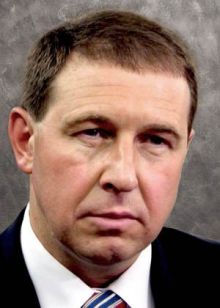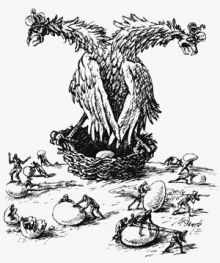The following is an interview with Andrei ILLARIONOV, a Russian libertarian economist, former economic policy advisor to President Vladimir Putin of the Russian Federation, currently a senior fellow with the Center for Global Liberty and Prosperity at the Cato Institute, Washington, D.C.
Recently the whole community of post-Soviet countries marked the 20th anniversary of the attempted coup d’etat, the last straw that broke the USSR’s neck. Several months from that date 15 Soviet republics proclaimed national independence, peacefully, without shedding human blood, unlike Yugoslavia. Have all of their expectations — primarily those of Russia and Ukraine — come true in terms of effective economy in the first place?
“If there were any such expectations, I’d refer them to the political elites rather than the populace. From the standpoint of those elites, the biggest independence expectations had certainly came true. All those 15 republics gained formal international sovereignty.
“Independence was something many people associated with being able to live independently and in a better way, in the first place, enjoying human rights and liberties. After 20 years, the results vary in these former Soviet republics.
“It is necessary to ascertain what those elite understood by the notion of independence while being engrossed in their power plays. Being independent of whom? Nomenklatura? Moscow? One’s own people? Answers to these questions vary in each case.
“Russia and Ukraine. For many individuals concerned, the answers to these questions proved unsatisfyingly diversified. Living independently turned out much harder than visualized 20 years ago. Back in the 1990s, there was the naive opinion that, after being diplomatically recognized, you could meet the European living standard after a couple of years. This has never happened, with some of the [former Soviet] republics getting close and others falling further behind. That’s why we have varying attitudes in various republics.”
How would you determine this naive attitude?
“Twenty years back we had a vague idea about market economy, democracy, civil society, nation-state. At the time millions lived having two primitive concepts of the world. Many were sick and tired of communist propaganda with its fake comparisons between the lasting advantages of socialism and the doomed capitalist world. People in the Soviet Union could sense rather than comprehend this falsehood. What followed was what is known in medicine as foreign body reaction, an idealized picture of life abroad. For many people utterly false communist propaganda served as proof of the following two inferences: (a) Living in the West is great; (b) Meeting Western living, security and other standards won’t be difficult. Reality has proved different; one has to work long and hard to climb another rung on the social ladder, but this is nothing compared to the slavish way of life under communism.”
UKRAINE’S ECONOMIC POLICY FACILITATED CLANNISH OLIGARCHY IN THE 1990s
How come the cooperative ties between the former Soviet republics couldn’t be fully restored after the collapse of the Soviet empire? Was it because political, rather than economic, reasoning came first? It’s true that the loss of such cooperative ties spelled disaster for many ex-Soviet republics, particularly Ukraine. This meant losing giant industrial enterprises, even industries.
“It was practically impossible to preserve what you’ve just described as cooperative ties in full measure. You have also correctly pointed out the political reasoning. The fall of many empires — those of Spain, Turkey, Austria-Hungary, Great Britain, France — was accompanied by the severing of inner business connections. Severing such contacts between the former Soviet republics was inevitable.
“Was it what we all wanted at the time? Yes and no. Former contacts, even if frequently politically motivated, have been replaced by business ones, with some of the political factors behind all this replaced by other ones. The fact remains that all such reasoning has changed considerably over the past 20 years. The ex-Soviet republics are now doing active business with the West (even though lacking former production capacities). These businesses have adjusted to modern conditions, with an eye to world market requirements, those of domestic and foreign consumers.”
Would it be safe to assume that Ukraine and Russia have sort of met on the road while monopolizing power and capital?
“Power and capital merge in both countries. Monopolizing? Yes for Russia, no for Ukraine. There is no monopolizing in Ukraine as yet. You still have several centers with a definite political and economic strength; one clearly visible in the east of Ukraine, and the other, as clearly visible, in the west. There are clans involved in and with the southern and central regions of Ukraine. Each such clan has been politically and financially supported by the central government. However, none has been monopolistic in the 1990s-2000s. There is business and political power play going on in your country, even though in your own specific way. It contributes to your current semitotalitarian regime. What you have is a clannish competition, but it is competition. Keeping this competition ticking is a guarantee of having a healthier, better politically organized society, a better economy compared to what we have in Russia.
“In Russia, unlike Ukraine, all economic, financial, political, and media resources have been monopolized by a single clan. Those few oligarchic groups that tried to wage a more or less independent policy were destroyed in 2000, with the last one, Yukos, meeting their end in 2003. A team of secret police officers started by monopolizing power and then capital.”
KEEPING UKRAINE, BELARUS, AND GEORGIA INDEPENDENT: RUSSIA’S LAST CHANCE OF DEMOCRACY
You are known as an exponent of what is currently a highly officially disliked theory of the Russian Federation’s collapse in the near future. Is there an alternative?
“The value of a theory is determined not by its popularity but by how it conforms to reality. On March 17, 1991, the theory of the Soviet Union’s inevitable collapse didn’t seem very popular, but then reality proved the ‘popular theory’ wrong.
“Our country [i.e., Russia] is experiencing the third phase of destruction of what is left of a body politic previously known as the Russian empire; later, as the USSR, and finally as the Russian Federation. Our ancestors witnessed Phase One in 1916-19, followed by the communist version of the Reconquista (1919-mid-1980s). Then came Phase Two, a period that peaked in 1988-91, followed by yet another Reconquista, launched by the [Kremlin] imperial rulers in 1992-94. It is still underway. Preparations for Phase Three — the fall of the Russian empire — started getting made simultaneously. This process is historically substantiated and doesn’t depend on the will or mood of any given politician in Russia. Here is the price to be paid for this imperial phantom by peoples within and without Russia.”
Lilia Shevtsova, a noted Russian political analyst, visited The Day and said that Ukraine is like litmus paper for Russia, so it can determine whether it has survived the complexities of statehood. She said Ukraine is Russia’s chance of getting democratic. What do you think? Does Russia stand a chance of ridding itself of the imperial complex and becoming yet another democracy?
“Lilia Shevtsova has a point there. Ukraine is an important indicator that can show whether or not Russia has got rid of its imperial complex. There are also two other as important indicators: Belarus and Georgia. These three countries are close to Russia in terms of geography, culture, and mentality. For some part of Russian society, afflicted with the imperial syndrome, getting Belarus, Ukraine, and Georgia under control (whatever it takes: finance, economy, politics, a secret alliance between the heads of state, you name it) is number one on their imperial supremacy agenda.
“However, keeping Belarus, Ukraine, and Georgia independent is important for these countries and for Russia. It is only by rejecting the imperial ambitions, doing so indeed, not on paper, will Russia stand a chance becoming yet another modern democracy. For as long as Russia keeps trying to revive its imperial status — in the Crimea, Abkhazia, South Ossetia — it will stand no such chance.”
CUSTOMS UNION: SIGNS OF ANOTHER RECONQUISTA
Do you think that the Customs Union is indicative of Russia’s imperial complex? Or maybe it is a rational decision made in order to make progress in the foreign trade domain?
“My answer is yes and no. The Customs Union idea sounds great, a natural means of economic integration between countries with varying economies. It largely reflects the process experienced by Western Europe over the past 60 years. However, what matters is not the form but content of the process, its objectives — including those kept away from the public eye. One can have an idea about them judging by the persons who have actually initiated this process. Their statements shed light on this process. The Customs Union was initiated by Russian politicians, people who didn’t bother to conceal their imperial ambitions, who actually voiced them and felt proud about it. Small wonder that the CU idea, originally a peaceful economic concept, should turn into another Reconquista.”
Should Ukraine be wary of Russia’s aggressive attitude to its foreign economic integration? You were Prime Minister Vladimir Putin’s economic policy advisor, so you must remember his ultimatum-like statement to the effect that Ukraine would be barred access to the Customs Union, should it join the EU free trade area.
“Threats, blackmail — these are surely means one ought to discard to reach the end. Integration is something you do of your own free will. When they start forcing you into some or other union, be it Soviet, customs, one of independent [post-Soviet] states, it means you should step aside and run away.
“The European Union is strong simply because no one has ever forced anyone to join it. In fact, there is a membership waiting list. A number of countries have spent years doing their homework to meet the EU rigid admission requirements.”
CRISIS OF CAPITALISM: WISHFUL THINKING
What about the economic policy being waged by Ukraine and Russia? Any mistakes and/or achievements?
“I wouldn’t want to comment on Russia’s current policy. As regards Ukraine’s economic policy over the past year and one half, I don’t have data enough to pass judgment. All I can say is your reform appears to be carried out using our good old bureaucratic methods. This can only add to your public distrust of those in power today.”
Precisely ten years ago you were named Financial Oracle of the Year, in recognition of your outstanding merits, predicting financial events. What do you think we can expect from the world market next year? This year has been packed with all kinds of events, ranging from financial crisis to US default to quakes in Greece, Italy, Spain, protest rallies in Tunisia and Egypt, with most countries remaining within the risk area.
“It is impossible to make forecasts on such broad scope. There are different countries with varying situations. As for the largest world economy centers — the US, the EU, and Russia — they are likely to enter a period of stagnation sometime in 2012.”









